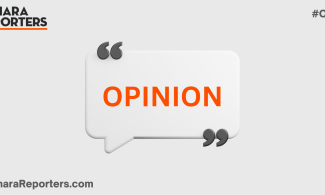
In a recent incident around the Federal Capital Territory (FCT), the Economic and Financial Crimes Commission (EFCC) conducted a crackdown on individuals labeled as "illegal exchange operators”. However, the heavy-handed approach resulted in chaos and raised questions about the efficacy of such actions in addressing Nigeria's economic challenges.
Nigeria is full of dramas and unfortunately the elements leading the nation would have been better off as Nollywood actors rather than the responsibilities they are shouldering.
This incident is just one example of the missteps by financial regulatory bodies. This isn't the first time EFCC and other financial bureaucracies have been trying to pacify and massage the ignorance of their "tune-piper". The attempt by Emefiele to attribute currency fluctuations to Abokifx is indicative of a tendency to scapegoat rather than address underlying issues effectively.
Dramatically, but unfortunately, how could echelons of a nation's economy be mere novices or 'jankariwos' who have never read the ordinary ‘Essential Economics' to comprehension? How would you think that a single ‘jalabiya-wearing’ entity who isn't an institution, within the confine of his 'nine-asbestos' room could dictate the direction of the nation's economic trends just by speculating? A man who doesn't hold any fragment in the commanding height of the economy?
But who are these so-called ‘illegal operators’? Often, they are street traders, colloquially known as ‘abokis’, conducting currency exchanges in commercial hubs. While their activities may appear informal, they are symptomatic of broader systemic issues within Nigeria's financial system.
It's essential to consider: Do these individuals manufacture dollars? No, they operate within a network that includes complicit banks, where illicit dealings among officials facilitate the flow of currency, undermining the nation's stability. Can it be said that one must have hastily concluded that MasterCard must have been barred from cross-border transactions to aid this evil arrangement by the banking sector? I think the use of Mastercard would have served the purpose of grounding the businesses of these so-called ‘illegal operators’ and the bank officials complicit in this.
Moreover, political figures and CBN officials are implicated in this corruption, benefiting from the illicit trade in foreign currency. Despite this, the EFCC's focus remains disproportionately on street-level traders, neglecting those truly responsible for economic malpractice.
This selective enforcement reflects broader patterns in Nigeria's regulatory approach. This is synonymous to "task forces" clamping down on petrol black-market sellers, while ignoring the filling stations who are the major distributors to them; NDLEA clamping down on random smokers holding one or two rolls of "ewe ola" while overlooking the big conglomerates holding the bases of these illegal businesses. Just as authorities crack down on minor offenses while overlooking institutionalized corruption, EFCC's targeting of street traders fails to address the systemic issues within financial institutions and political circles.
Additionally, the emergence of online forex and crypto trading presents new challenges for regulatory oversight. Will EFCC extend its tactics to individuals trading from home? The uncertainty underscores the need for consistent and equitable enforcement measures.
In confronting Nigeria's economic challenges, it's imperative to acknowledge the contradictions inherent in the current system. While capitalism theoretically promotes market efficiency, the reality often falls short.
And since you (EFCC, finance capitals and the ruling elites) have all agreed to move on with the system called capitalism where demand and supply is expected to naturally or spontaneously bring down prices of goods and services, why are contradictions and exceptions in this case? Isn't this even the rationale behind Jagaban’s flotation of the Naira?
The recent decision to float the Naira highlights these challenges, yet leaders hesitate to confront the failures of neo-liberal policies. Emefiele made currency notes scarce partly to curb kidnapping, to raise the value of the Naira. And what has happened to the prevalent evil called ‘kidnapping’?
Arbitrary subsidy removal, over-demand for imported brands and almost no export revenue as a result of downed productivity, racketeering and hoarding of dollar and foreign currencies, commodification of goods by nation's economic bourgeoisie such as cement and food-producing companies, high demand and strain on foreign exchange by migrants seeking education and medicals abroad, the resultant dollarisation of the economy, etc., all seem to have no meaning to EFCC? “And na Jalabiya-wearing fellows you wan make scapegoats?”
In the last presidential primary elections, delegates were paid in dollars equivalent to billions of naira flooding the economy. Please clampdown on yourselves now, as this is the most grievous, but most conscious knockdown dealt on the Naira. Prove your passion and love above self-interest for this country please.
I heard BAT said he would never mull over a thought on price regulation. "Abi na you Fella dey follow talk when he say, 'if you dey follow follow, make you open sense'?" Are you keen to follow western finance capitals even when it has landed us here?
Reality of time will tell!
Until the ruling class, keen to pay off loyalists by conceding to them the seats dictating our fate collectively instead of conceding them to the most talented ones, makes a U-turn, Nigeria will sink deeper like the Titanic. Things will fall apart, the center will not hold.
Imminently, chaos or revolution is inevitable. It may be chaotic and leads to nowhere or to hell, if there is no ideological base and structure for it. It may be social-scientific and result-yielding if it has a politico-ideological base and structure. "Where is the structure?" is the question I'm still finding answers to, since the Labour are still fraternizing and dining with the devil with their long spoons.
Meanwhile, tell EFCC to leave slim, jalamia-wearing abokis alone and pursue the untouchable giants. Will they do that? I doubt so. "O maa ta ba ara ile, o maa ta ba ara oko.”
Femi Olotu,
Social Rights Activist.